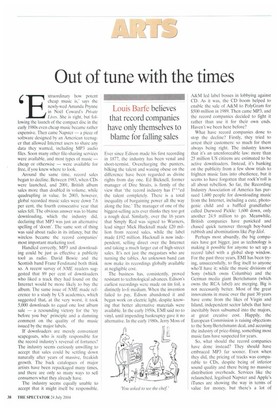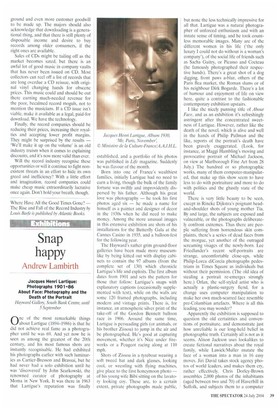Out of tune with the times
Louis Bade believes that record companies have only themselves to blame for falling sales
E.
xtraordinary how potent cheap music is,' says the newly-wed Amanda Prynne
in Noel Coward's Private Lives. She is right, but following the launch of the compact disc in the early 1980s even cheap music became rather expensive. Then came Napster — a piece of software designed by an American teenager that allowed Internet users to share any data they wanted, including MP3 audio files. Soon many other file-sharing services were available, and most types of music — cheap or otherwise — were available for free, if you knew where to look.
Around the same time, record sales began to decline. Between 1983, when CDs were launched, and 2001, British album sales more than doubled in volume, while quadrupling in value. In 2003, however, global recorded music sales were down 7.6 per cent, the fourth consecutive year that sales fell. The obvious answer was to blame downloading, which the industry did, declaring that MP3 was just an alternative spelling of 'doom'. The same sort of thing was said about radio in its infancy, but the wireless became the record companies' most important marketing tool.
Handled correctly, MP3 and downloading could be just as effective a publicity tool as radio. David Bowie and the Scottish band Franz Ferdinand both think so. A recent survey of NME readers suggested that 89 per cent of downloaders who liked a track they had found on the Internet would be more likely to buy the album. The same issue of NME made reference to a study by US academics, which suggested that, at the very worst, it took 5,000 downloads to equal one lost album sale — a resounding victory: for the 'try before you buy' principle and a damning comment on the quality of the music issued by the major labels.
If downloaders are merely convenient scapegoats, who is really responsible for the record industry's reversal of fortunes? The industry seems curiously unwilling to accept that sales could be settling down naturally after years of massive, freakish growth. The back catalogues of major artists have been repackaged many times, and there are only so many ways to sell consumers what they already have.
The industry seems equally unable to accept that it might itself be responsible. Ever since Edison made his first recording in 1877, the industry has been venal and short-termist. Overcharging the punters, bilking the talent and waxing obese on the difference have been regarded as divine rights from day one. Ed Bicknell, former manager of Dire Straits, is firmly of the view that 'the record industry has f'ed the talent completely. There is a total inequality of bargaining power all the way along the line.' The manager of one of the biggest-selling acts ever thinks they too got a rough deal. Similarly, over the 16 years that Simply Red was signed to Warners, lead singer Mick Hucknall made £20 million from record sales, while the label made £192 million. Hucknall is now independent, selling direct over the Internet and taking a much larger cut of high-street sales. It's not just the megastars who are turning the tables. An unknown band can now make its recordings globally available at negligible cost.
The business has, consistently, proved resistant to technological advances. Edison's earliest recordings were made on tin foil, a distinctly lo-fi medium, When the invention failed to pay, Edison abandoned it and began work on electric light, despite knowing that better alternative materials were available. In the early 1950s, EMI said no to vinyl, until impending bankruptcy gave it no alternative. In the early 1980s, _ferry Moss of A&M led label bosses in lobbying against CD. As it was, the CD boom helped to enable the sale of A&M to PolyGram for $500 million in 1989, Then came MP3, and the record companies decided to fight it rather than use it for their own ends. Haven't we been here before?
What have record companies done to stop the decline? Firstly, they tried to arrest their customers: so much for them always being right. The industry knows that it's an unenforceable law: more than 25 million US citizens are estimated to be active downloaders. Instead, it's banking on the publicity from a few show trials to frighten music fans into obedience, but it seems to have forgotten that rock'n'roll is all about rebellion. So far, the Recording Industry Association of America has pursued 1,600 people for downloading music from the Internet, including a cute, photogenic child and a baffled grandfather called Durwood Pickle: 1,600 down, only another 24.9 million to go. Meanwhile, British companies have panicked and chased quick turnover through boy-band rubbish and abominations like Pop Idol.
Perhaps most absurdly, the big companies have got bigger, just as technology is making it possible for anyone to set up a record label with a global shop window. For the past three years, EMI has been trying, unsuccessfully, to flog itself to anyone who'll have it; while the music divisions of Sony (which owns Columbia) and the German media giant Bertelsmann (which owns the RCA label) are merging. Big is not necessarily better. Most of the great innovations in music over the past 30 years have come from the likes of Virgin and Island, independent sector labels that have inevitably been subsumed into the majors, at great creative cost. Happily, the European Commission is raising objections to the Sony/Bertelsmann deal, and accusing the industry of price-fixing, something most music fans have suspected for years.
So, what should the record companies have done instead? They should have embraced MP3 far sooner. Even when they did, the pricing of tracks was comparable to CDs, despite being of inferior sound quality and there being no massive distribution overheads. Services like the relaunched, legalised Napster and Apple's iTunes are showing the way in terms of value for money, but there's a lot of ground and even more customer goodwill to be made up. The majors should also acknowledge that downloading is a generational thing, and that there is still plenty of disposable income and desire to buy records among older consumers, if the right ones are available.
Sales of CDs might be tailing off as the market becomes sated, but there is an awful lot of good music in company vaults that has never been issued on CD. Most collectors can reel off a list of records that are long overdue a CD reissue, with original vinyl changing hands for obscene prices. This music could and should be out there earning much-needed revenue for the poor, becalmed record moguls, not to mention the musicians. If a CD issue isn't viable, make it available as a legal, paid-for download. We have the technology.
Finally, the record companies should be reducing their prices, increasing their royalties and accepting lower profit margins. They might be surprised by the results — 'We'll make it up on the volume' is an old industry truism when it comes to explaining discounts, and it's now more valid than ever.
Will the record industry recognise these opportunities or will it continue to fight nonexistent threats in an effort to hide its own greed and inefficiency? With a little effort and imagination, record companies could make cheap music extraordinarily lucrative once again. Don't hold your breath, though.
Where Have All the Good Times Gone? — The Rise and Fall of the Record Industry by Louis Batfe is published by Atlantic Books.



























































 Previous page
Previous page